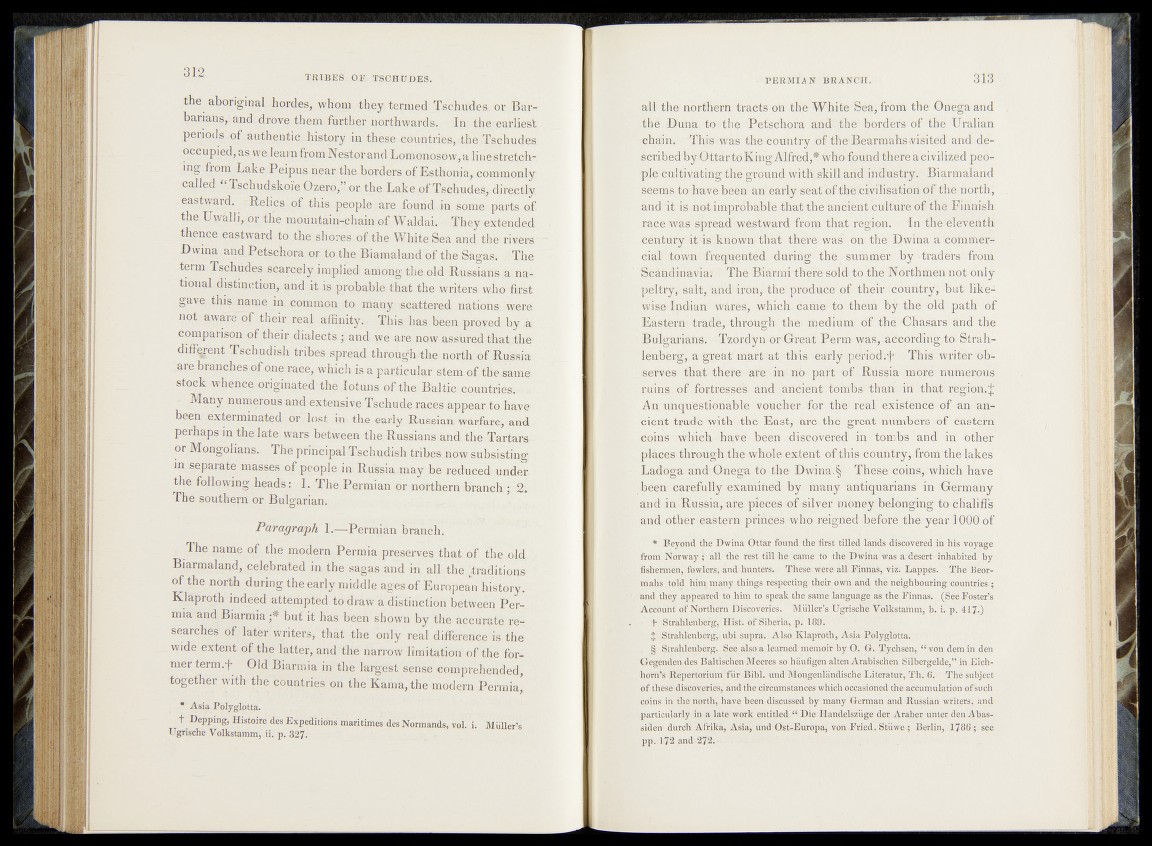
the aboriginal hordes, whom they* termed .Tschudes^or Barbarians,')
and drove them further northwards. In th&fc^arliest
periods! of authenfie&history In these, countries, .the -.Ts.chudes
occupied, as wedearn from.Nestor and Lomonospw,a linestretching,
from Lake Peip^near^the borders,of Esthonia,ïcómmonly.
galled “ Tsdiudskoi'e Ozero,” nr, the. Lake of T s c h u d e ^ ’rectly
eastward. Relics of this people are found Jn some parts of,
the üwâlliy or tge. mountain-chain of Waldai. They extended
thence eastward to the shores.of the White,Sea and the f a m '
Dwinà and.Petschora or to the Biamalandof theBagag-. The
term Tschudes scarcely- implied among the,old Russians a.na-
tiopal distinction,, and it is probable, that the-writers.who first
gave this, name in common to many scattered nations*; W,em
n o t aware of their real affinity. This. has. been proved by ,a
comparison of their dialects.;, and we are now:asiur,e|ètha1utlftf
different Teehudish tribes spread throùgh&he: north/ÿf Russia
are brandies ÿ one race, which is a particular stem.of the same-
stock wheime originatedHlm,rotuns of the" B a lf^ k o u n tw ^ S
- Many numerous and extensive Tscfiude racfes,âppear|^haÉ&-
been exterminated or lost in the early Russian warfare, and
perhaps in the late wars between the Russians and the Tartars,
or Mongolians. The principal Tschudish tribes, now subsisting,
in separate masses of people in Russimmay be reduced under,
the following heads: 1. The Permian or northern branch.;.2.
The southern or Bulgarian.
Paragraph 1.—Permian branch.
». Tile name of the modern Permja preserves that of. the old-1
Biarmaland, celebrated in the sagas and in all the atraditions
of the north during the early middle ages of European history.
Klaproth indeed attempted tedraw a distinction between Per-
mia and Biarmia ;# b u f it has been shown by the; accurate re-
searches of later writers, that the only real difference is the
wide extent of the latter, and the narrow limitation* of the former
terrh.f Old Biarmia in the largest sense comprehended,
together with'the Countries on the Kama, the modern Permia,
" Asia Polyglqtta.
t Depping, Histoire des Expeditions maritimes des Normands, vol, i, Muller’s
Ugrische Volkstamm, ii; p. 327.
all- themertiherfr^i’aotAom'fcHe White 'SiaJ from the Onega and
Lhe Du^ai tof||fei“'Pf^ihora and tbhf bbrdhi& of the Uralian
chain. This -y^as^Be5ohi|itfy of the’Bearmahs visited and de-
s c r i b e t t a h t o King^ltfed^- whodbutfd there a civilized ped-.
ihdnstrys Biarmaland
^eemstohav&b8#h^&nfeaTlyisAeat^fll^Mjvihsatidn"of the norths
and the Finnish
rratofe spreh&we^Ward from that; region. In m#iitlfewnth
..eh'Eiltjfftry.it is\known. th&J D winaia pljphhercial
town- thb, s u m m e f i t r a d e s from
,^,&&hdinaviaf l T fe Biarmi d # f e i f p ® t l o n l y
peltrv, salt, aw'd'iron,«the prod'uctppf- thoiisicdShtffcj^-but like-,
w i^ iIn.dS'an’»Kwa^S which^&aJae' by- the?;'<Md^path oj
Eastteri tt%dh^-thi^^hMh^^ed’inM^df3th^|l€3!hfh^hES^tnd the
Bulgarians.' {Tzordyn|^iit€lrea>t Perm*;wasjta’Scvpditfg,td StTah-
'leM ^ '^ ^ ^ e a ^ in a 'r t’a t ‘this eAiy tp'ermd';^ This ^lilfer^hi
js&pv^lthat1 there1 ate' in- nJ&jyp&ill " # |AlRu|sia more numerous
irliiins of fordilltih^ and than -in thatJ^g^h/ijf
A n...’uh<quidfe#dn'ab|d fML e x® f^ ^ ^ )f’%n Ancient
trade- with-" Che Eastward-the ’JpliiJi#'i^mbersf”-of; ■ eastern
caiiis' wM^mi ha&ebcbtMfi. d|sdo¥dS|d! hn> tombs "and in^Mher
places'through the w hp|^^feen%^hthisi&lMhfry ^fpbm^tlTh lakes
L adtog^l and>Onega, tp *the 'D wina. § T-h e s©»cj$iii s;"which hhive
been; carefu lly^e'xamined^y 'many ’Unt-i qu&tiatns ’hifGermany
•arid inlRmssia,-'arejp^gs;of.silver money belongifi^tbmhaliffs ■
and!other;eastern- primes who^^gnedsbdFore -the^ye&r 1 ©DO of
* Beyond the Dwina Ottar found, the first ^U J^ la n ^ dljcovbrtd in his voyage
from Norway ; all the rest fill Be came to 'tfi| Dwina was a desert inhabited’ t y
hsbermen,'-fo,wlers, and. hunters. These'4^e|aR;Finnas, vi»: Lappesi - The Beor-
jhahs. tbld hinj njapy things respecting:: their own and the neighbouring countries;
and they appeared to.nim to speak t^e sam^ language as the Finnapr.^See Fosters
Account of Northern Discoveries. Muller's .Ugrijfche. Volkstrarnm, b. i. p. 417;)
• f Strahlenberg, Hist; of Siberia, p.- 189.
' : $ Strahlenberg,:ubi',supra. Also Klaproth, Asia Polyglotta, :.
, 8 Strahlenberg. See also a learnedonemoir'hjt O. Gr. ^^chsep, “ yon, dem In den
Gegenden des Baltischen Meeres so haufigen altenArahischen Silbergelde,” in Eich-
hor&’s Repertorium^ftir:Bibl.'■ uPd Mongenlandische Literatu'r, Th. 6 . The subject
of these, discoveries, and'the'circumstances whicKoc'easibned the .accumulation of sucli
l^lfis in-the north, have been discussed by many German and 'Russian writers] and
particularly in a late'work entitled,)‘tDi,e,Handelsziige der Araber unler den Abas-
siden: duron Afrika, Aria; und Ost-Europa, vomFried, Stiiwe; ^Berlin, 1788 ; see
pp.-1-7-2 ,and»2 7 2 . -